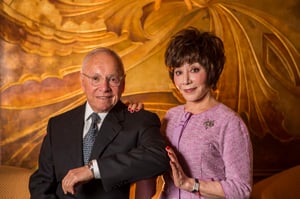
Wonderful Co. is getting cracking on another big marketing push this year, with a special focus on pistachios as the company looks to market its way out of a potential glut as California comes off a record harvest.
The West L.A.-based produce giant plans to spend more than $115 million on marketing this year, said Adam Cooper, vice president of marketing. Wonderful is the state’s largest grower and processor of pistachios, and reported revenue of $4.8 billion in 2016.
Its upcoming marketing blitz for pistachios is expected to account for $50 million and include commercials during Sunday and Monday night football broadcasts and a deal with several Major League Baseball teams to sell Wonderful pistachios in their ballparks, the company said.
Wonderful’s stable of products also includes Wonderful almonds, Halo mandarins, Pom Wonderful pomegranate products, Fiji Water and Teleflora flower delivery.
New York-based Kantar Media estimated that Wonderful spent almost $122 million last year on advertising.
This year’s budget loads up on pistachios because the nut crop is expected to see a strong harvest after this winter’s bountiful rains.
Wonderful’s advertising budget has dwarfed its produce peers for at least the past two years, according to Kantar, which tracks different forms of media including TV, online, billboards and print.
“We believe (the $115 million) represents the biggest marketing investment of any other U.S. produce brand, and (is) larger than the marketing investments of all other major U.S. produce brands combined,” Cooper said in an email.
Fresno-based American Pistachio Growers – a trade association and cooperative marketer – spent $2.1 million last year on general marketing of the crop. The trade group did not return requests for comment.
All of Wonderful’s advertising creative work and buying is done in-house, Cooper said.
The company’s marketing game is driven by Lynda Resnick, a former ad executive who co-owns the company with her husband, Stewart. The couple landed at No. 10 on the Wealthiest Angelenos list this year, with a 1 percent increase in their net worth to $5 billion.
Getting the business
Lynda Resnick met her future spouse in the early 1970s when she tried to convince him to hire her ad agency for his janitorial service company.
“I lost the account,” she wrote in her book “Rubies in the Orchard.” “But I sure got the business.”
The couple built Wonderful over the years together, slowly acquiring land in the San Joaquin Valley, with Stewart serving as chief executive and Lynda guiding the marketing.
The company said it owned 30,000 acres of pistachio crops as of last year.
That makes it the largest grower in the state, according to Bob Klein, manager of the Administrative Committee for Pistachios, a national marketing organization based in Fresno.
The company’s crops generated an average net return of $3,519 an acre in 2014, Stewart Resnick told the Western Farm Press.
The company also sells fruit and nuts grown by other farmers. About half of the state’s 1,200 pistachio growers sell some or all of their crops to Wonderful, making it the largest processor in the state, Klein said. He estimated that the Resnicks’ company sells 55 percent to 65 percent of the state’s total output, including the produce it gets from other farmers.
Last year the state produced a record of about 900 million pounds of pistachios after a particularly poor run caused by the drought and unusually warm weather, he said.
“The crop yields for the five years before 2016 were impacted by the drought,” Klein said. “There was a lack of winter chill associated with a lack of rain. Now we’re making up for the lag in production.”
The sales value of pistachios decreased 47 percent in 2015, according to a report by the California Department of Food and Agriculture, amid a general decline among produce in the state.
California exported $848 million in retail sales of pistachios that year. The 2016 numbers aren’t yet available.
Klein said the state exports about 60 percent of its pistachio crop.
He estimated this year’s harvest, which will start in August, would be between 550 million and 650 million pounds.
The large crops have led to dropping retail prices, Wonderful’s Cooper said. A 32-ounce bag of Wonderful roasted and salted pistachios sells for $13.26 on Amazon.com.
Marketing maneuvers
The company has become known for its TV commercials that often feature celebrities and the catch phrase “Get crackin’.”
It has run commercials for the past three years touting pistachios during the Super Bowl broadcast, including one with comedian Stephen Colbert. Its TV ads have featured Miss Piggy, Manny Pacquiao, animated movie characters and a live elephant, all demonstrating the unique way they eat pistachios.
Healthy snack companies typically spend about 4 percent to 5 percent of their sales revenue on advertising, according to Lee Kovel, a partner at ad agency Kovel Creative.
Stockton’s Diamond Foods Inc., which sells Diamond and Emerald nuts in addition to Kettle Chips and Pop Secret popcorn, spent almost $11.9 million, or about 5 percent of its total sales, on advertising in 2015, according to an annual report filed with the Securities and Exchange Commission. Diamond was acquired by snack company Snyder’s-Lance Inc. last year for $1.27 billion.
Westlake Village-based Dole Food Co. Inc., which sells fresh produce and packaged snacks, spent $6.9 million on advertising and marketing out of a net revenue of $4.5 billion for the year ended Dec. 31, according to a prospectus for an IPO that the company filed with the SEC this year. That was a tenth of 1 percent of company revenue.
Wonderful’s marketing budget is just over 2 percent of its revenue at $115 million.
Cooper said the company’s expansive marketing efforts for pistachios became particularly necessary after the large harvest, which pushed retail prices down even more.
Kovel, who has worked with Dole, said he was still surprised about Wonderful’s strategy.
“($115 million) seems extraordinarily high,” he said. “If they’re spending that much, they’ll probably be successful because they’re outspending everybody else.”
